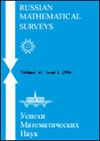Twisted tensor products of DG algebras
IF 2.1
4区 数学
Q1 MATHEMATICS
引用次数: 1
Abstract
Let A = (A, d) be a differential graded algebra (DGA) over a field k, that is, a Z-graded algebra A = ⊕ q∈Z A q with a k-linear map d : A → A, d = 0, of degree one that satisfies the graded Leibniz rule. Denote by D(A ) the derived category of right A -modules and by perf -A ⊂ D(A ) the triangulated subcategory of perfect modules generated by A , which is equivalent to the subcategory of compact objects D(A ) ⊂ D(A ) [5]. Suppose that A is finite dimensional. We denote by J ⊂ A the (Jacobson) radical of the k-algebra A. The ideal J is graded. Let S be the graded quotient algebra A/J , and let ε : S → A be the canonical homomorphism of algebras. We assume that d ◦ ε = 0 and d(J) ⊆ J , and consider S as a DGA with the trivial differential. In this case there are morphisms ε : S → A and π : A → S of DGAs, and the DGA A will be said to be S-split. Let e ∈ A be an idempotent, and let Pe = eA and Qe = Ae be the right and left projective A-modules. Since d(e) = 0, the A-modules Pe and Qe have the natural structure of DG A -modules. We denote by Pe = (Pe, d) and Qe = (Qe, d) the corresponding right and left DG A -modules. A right (left) DG module Φ will be called semiprojective if there is a filtration 0 = Φ0 ⊂ Φ1 ⊂ · · · = Φ such that every quotient Φi+1/Φi is a direct sum of projective DG-modules Pe (respectively, Qe). The simple right A-modules Se = Pe/eJ with d = 0 become right DG A -modules Se. We consider S as a right DG A -module and denote it by S. For any S-split DGA A , every finite-dimensional DG A -module M has a filtration 0 = Ψ0 ⊂ Ψ1 ⊂ · · · ⊂ Ψk = M such that every quotient Ψi+1/Ψi is isomorphic to some Se. Recall that a DGA A is called smooth if it is perfect as a DG bimodule.DG代数的扭张量积
设A = (A, d)是域k上的微分分级代数(DGA),即Z级分级代数A =⊕q∈Z A q,其k-线性映射d: A→A, d = 0,满足分级莱布尼茨规则。用D(A)表示右A -模的派生范畴,用perf -A∧D(A)表示由A生成的完美模的三角化子范畴,它等价于紧化对象的子范畴D(A)∧D(A)[5]。假设A是有限维的。我们用J∧A表示k代数A的(Jacobson)根。理想J是分级的。设S为阶商代数A/J,设ε: S→A为代数的正则同态。设d◦ε = 0, d(J)任任,S为具有平凡微分的DGA。在这种情况下,DGA存在ε: S→A和π: A→S的态射,我们称DGA A为S分裂。设e∈A是幂等的,设Pe = eA, Qe = Ae为左右投影A模。由于d(e) = 0, A模Pe和Qe具有DG A模的自然结构。我们用Pe = (Pe, d)和Qe = (Qe, d)表示对应的左、右dga -模。如果存在过滤0 = Φ0∧Φ1∧···= Φ,使得每个商Φi+1/Φi是投影DG模块Pe(分别为Qe)的直接和,则右(左)DG模块Φ称为半投影的。简单的右A模Se = Pe/eJ, d = 0变成右DG -模Se。我们认为S是一个右DG a -模并用S表示,对于任何S分裂的DG a -模M,每个有限维DG a -模M都有一个过滤0 = Ψ0∧Ψ1∧···∧Ψk = M,使得每个商Ψi+1/Ψi与某个Se同构。回想一下,如果一个DGA a作为DG双模是完美的,那么它就是光滑的。
本文章由计算机程序翻译,如有差异,请以英文原文为准。
求助全文
约1分钟内获得全文
求助全文
来源期刊
CiteScore
1.70
自引率
0.00%
发文量
12
审稿时长
>12 weeks
期刊介绍:
Russian Mathematical Surveys is a high-prestige journal covering a wide area of mathematics. The Russian original is rigorously refereed in Russia and the translations are carefully scrutinised and edited by the London Mathematical Society. The survey articles on current trends in mathematics are generally written by leading experts in the field at the request of the Editorial Board.

 求助内容:
求助内容: 应助结果提醒方式:
应助结果提醒方式:


